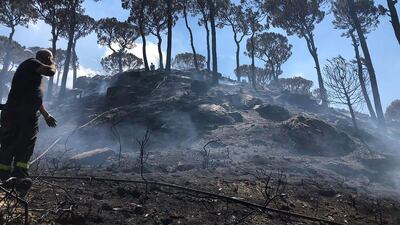Lebanon is increasingly at risk of mass-casualty wildfires like those that killed dozens in Greece last month, experts warned on Monday, as firefighters battled a three-day-long blaze in the north of the country.
Authorities doused 14-metre-high flames from helicopters in an effort to extinguish fires that swept across a large area of dense pine forest in the northern Akkar region. By Monday morning, 80 per cent of the fire was under control, officials said.
"This is very difficult fire due to its location," a civil defence spokesman told The National. "There are no roads that our trucks can use to get to it and extinguish it."
While wildfires are common in Lebanon during the summer months, a lack of forest management and climate change is causing fires to spread to areas they have not reached before, and burn for longer.
“This fire burning now is reaching areas that have rarely been affected, such as areas covered by fir trees, which are very low density and don’t burn as easily. We have also recently seen fires burning in higher elevations,” said George Mitri, director of the Land and Natural Resources programme at the University of Balamand’s Institute of the Environment in Lebanon.
Mr Mitri, an expert on wildfires, said the “unusual” forest fires in Lebanon this year could put lives at risk in a way that they have not before.
“We should be worried. If we don’t take the right measures we could be facing more disastrous fires that affect not only forests, but people too. We have many villages located in very high risk areas, and a lot of new residential projects being built in densely vegetated areas. They are vulnerable. What happened in Greece can happen in Lebanon,” he said.
The biggest spark for wildfires in Lebanon is negligence, or accidental fires. This usually takes the form of a farmer burning agricultural waste or a campfire left to burn. But there are longer-term, underlying factors that create the conditions for the fires to spread more easily.
The movement of people from rural areas to cities and towns over the last few decades has changed Lebanon’s forests dramatically. Where they were once pruned for firewood and grazed by animals, they have been left to grow more dense, creating a more favourable environment for fires to spread. The same has happened to agricultural land that was once cultivated but has now been abandoned.
Climate change is also playing its part. In Lebanon, there has been an increase in the minimum temperature over the winter, according to Nadim Farajalla, director of the Climate Change and Environment programme at the American University of Beirut.
"Precipitation has been pretty constant in Lebanon for the past 60 years. But the minimum temperature has been on the rise," Mr Farajalla told The National.
“You get less snow, which melts quicker, which means drier soil and drier conditions, which lends itself to conditions that can make fires worse.”
Mr Farajalla said the impact of forest fires on the environment is devastating.
“They destroy habitats for various insects, birds and mammals. They destroy vegetative cover which protects the soil from water and wind erosion. Once that cover is lost the soil becomes vulnerable to the elements and often times gets eroded. It would be practically impossible for plants to grow after that,” he said.
“Deforestation for the sale of timber was one of the main legacies of the Phoenicians. Deforestation from forest fires is the legacy of modern Lebanon.”
_______________
Read more:
Fighting fire with fire: How controlled blazes are used to avert a greater catastrophe
Biggest blaze in California history challenges firefighters
‘Everything we had is gone’: Grief racks Greek town ravaged by wildfires
_______________
Although there has not been much variation in Lebanon’s rainfall, Mr Mitri has found that both temperature and precipitation are playing their part in the increase of wildfires in Lebanon, and the length of the wildfire season.
A 2014 study by Mr Mitri found that based on the country’s predicted climatic changes, “Lebanon is expected to face an increasing risk of fire occurrence”.
“We still need more research, but an increase in temperature and decrease in precipitation is closely linked to the size and number and extent of fires,” he said.
The same is true elsewhere. This year has seen record-breaking fires across the northern hemisphere. In Europe, soaring temperatures have led to the largest fire in Sweden in decades, affecting more than 30,000 hectares of forest. Latvia, Portugal and Finland have all suffered major blazes this summer. Thousands of firefighters in California are currently battling the biggest wildfire in the state’s history.
The deadly fires that ravaged Greece last month left 91 people dead, making it one of the worst wildfire disasters in the country’s history. A deadly combination of dry weather and high winds were thought to be have helped the fires to spread, together with a poor response from authorities. The Greek government’s mismanagement of the fires has led to widespread anger, and led to the relatives of two people killed to file a lawsuit against officials.
Mr Mitri said that action needed to be taken in Lebanon to prevent wildfires threatening lives here.
“If we don’t take action to reduce fire hazards, things will get worse. Our forests will have more dry fuel, and as we see more extreme weather events, this will trigger a larger number of uncontrollable fires,” he said.
“We always say that firefighting happens before a fire occurs, not as a reaction.”
_______________
In pictures: Firefighters struggle to contain biggest wildfire in California's history

